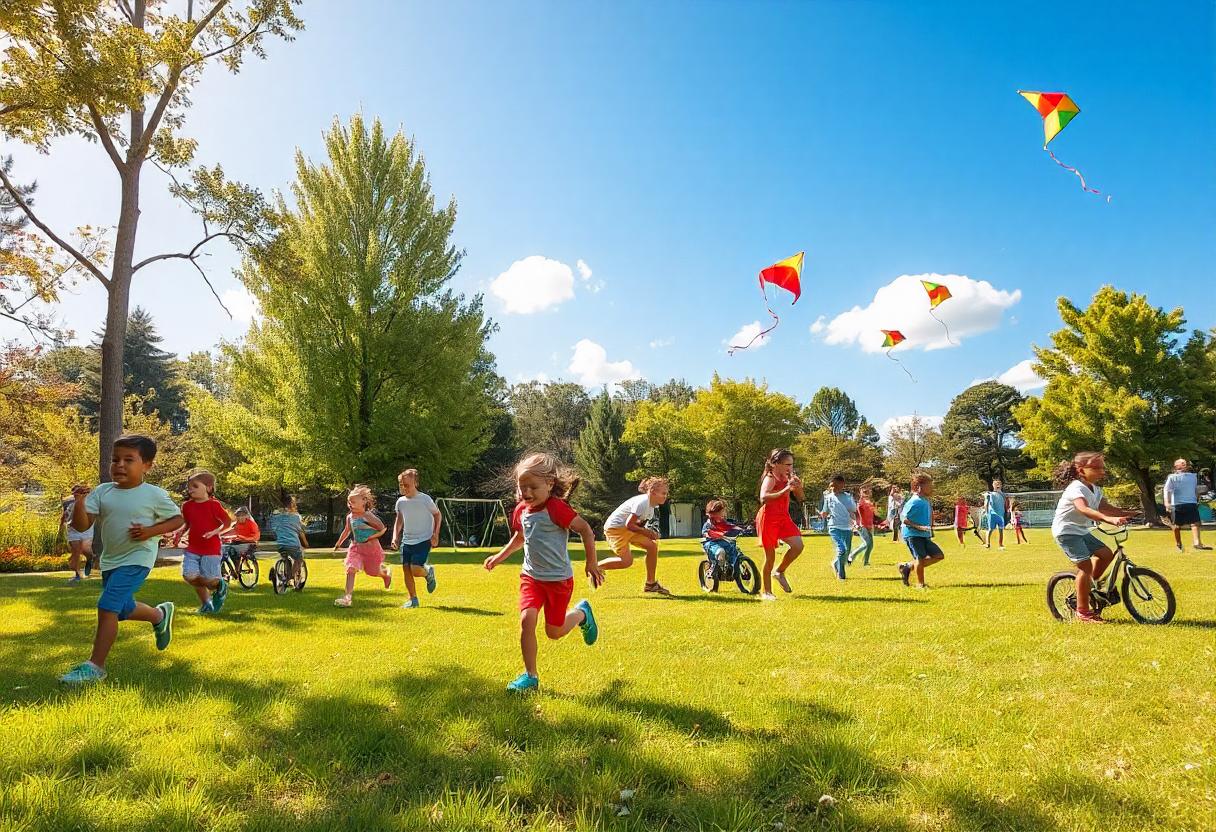The Benefits of Outdoor Play: Encouraging Physical Activity and Exploration
In an age where screens often dominate children’s lives, promoting outdoor play is more important than ever. Outdoor play is not just a chance for children to have fun; it’s essential for their overall development and well-being. This article explores the numerous benefits of outdoor play and provides practical tips for encouraging children to engage in physical activity and exploration.
The Physical Benefits
1. Enhances Physical Health: Outdoor play naturally incorporates physical activity, which is crucial for maintaining a healthy weight, building strong muscles and bones, and improving cardiovascular health. Activities such as running, climbing, and jumping help develop gross motor skills and coordination.
2. Improves Motor Skills: Playing outside provides children with opportunities to refine their motor skills. Activities like riding a bike, playing catch, or navigating playground equipment enhance hand-eye coordination, balance, and agility.
3. Boosts Immune System: Exposure to natural elements and fresh air helps strengthen the immune system. Studies have shown that children who spend more time outdoors are less likely to suffer from allergies and colds.
The Cognitive Benefits
1. Encourages Creativity: The outdoors offers a world of open-ended possibilities. Natural settings stimulate creativity and imagination as children invent games, explore new environments, and interact with natural materials.
2. Enhances Problem-Solving Skills: Outdoor play often involves navigating challenges and solving problems, whether it’s figuring out how to climb a tree or creating a makeshift shelter. These experiences foster critical thinking and problem-solving abilities.
3. Supports Cognitive Development: Exposure to diverse environments and sensory experiences helps with cognitive development. Nature-based play can improve attention spans and boost academic performance by providing a break from structured, indoor learning.
The Emotional Benefits
1. Reduces Stress and Anxiety: Spending time outdoors has been linked to lower levels of stress and anxiety. The natural environment has a calming effect, helping children to relax and manage their emotions more effectively.
2. Builds Confidence and Resilience: Overcoming outdoor challenges, such as learning to ride a bike or climbing a rock, builds confidence and resilience. Children gain a sense of accomplishment and learn to handle setbacks, fostering a growth mindset.
3. Strengthens Social Skills: Outdoor play often involves social interaction with peers. Playing in groups helps children develop important social skills such as cooperation, negotiation, and communication.
The Social Benefits
1. Fosters Teamwork and Cooperation: Outdoor games and activities often require teamwork and cooperation. Children learn to work together, share, and support one another, which are valuable social skills that transfer to other areas of life.
2. Encourages Independence: Exploring the outdoors allows children to make their own decisions and take initiative. This sense of independence is empowering and helps them develop a sense of autonomy and self-reliance.
3. Promotes Family Bonding: Outdoor play provides opportunities for family members to spend quality time together. Whether it’s a hike, a picnic, or a game of frisbee, these shared experiences strengthen family bonds and create lasting memories.
Tips for Encouraging Outdoor Play
1. Make It a Routine: Incorporate outdoor play into your daily routine. Set aside specific times each day for outdoor activities, and make it a regular part of your family life.
2. Lead by Example: Show enthusiasm for outdoor activities by participating yourself. Children are more likely to engage in outdoor play if they see their parents enjoying it too.
3. Create a Safe Environment: Ensure that outdoor spaces are safe and accessible. Supervise younger children and provide appropriate safety gear for activities like biking or climbing.
4. Offer a Variety of Activities: Provide a range of outdoor options to keep children engaged. From sports and games to nature walks and gardening, offering diverse activities helps maintain interest and excitement.
5. Encourage Exploration: Allow children to explore their surroundings and discover new interests. Whether it’s investigating a new park or observing wildlife, exploration fosters curiosity and a love for nature.
Conclusion
Outdoor play is more than just a recreational activity; it’s a vital component of a child’s development. The physical, cognitive, emotional, and social benefits are profound and far-reaching. By encouraging outdoor play, we not only help children lead healthier lives but also foster their growth, creativity, and well-being. So, let’s embrace the outdoors and inspire the next generation to explore, play, and thrive.
